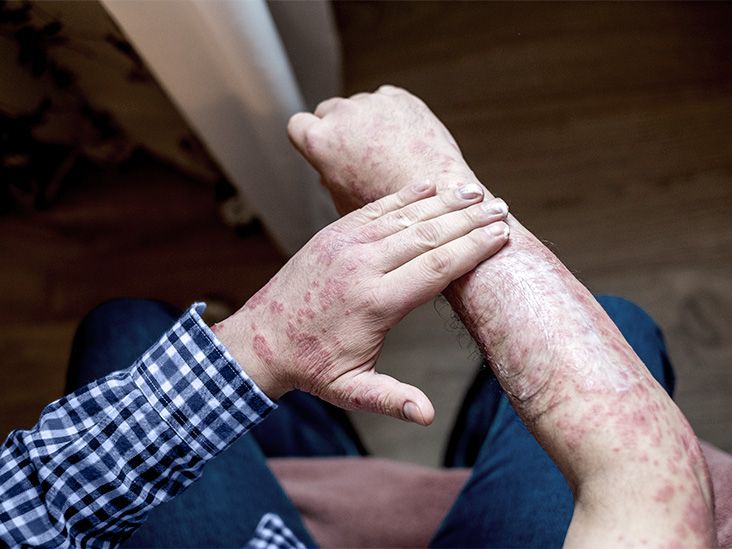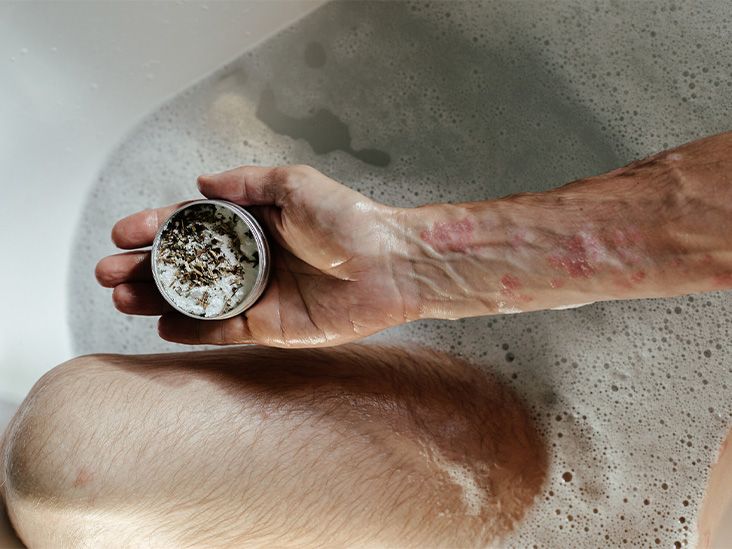Stress, infections, and corticosteroid withdrawal are known triggers of generalized pustular psoriasis (GPP). However, doctors cannot attribute every GPP flare to a specific cause.
Psoriasis is an immune-mediated dermatological disorder that occurs when immune system dysfunction leads to excessive skin cell growth and inflammation. Several types of psoriasis exist, including GPP, a potentially life threatening form characterized by intense and widespread inflammatory responses.
Unlike other types of psoriasis, GPP involves severe bouts of systemic (body-wide) inflammation that causes painful, sterile pustules over large areas of inflamed skin. The condition can also lead to symptoms such as fever, chills, dehydration, and organ impairment.
The most dangerous form, known as Von Zumbusch GPP, features a sudden onset of symptoms with rapid progression that can quickly become life threatening.
People living with GPP experience periods of remission, where symptoms are minimal or absent, mixed with times when symptoms worsen. These episodes where symptoms increase, known as flares, are often linked to specific triggers.
This article explores the causes and triggers of GPP and how people can manage the condition.
The exact causes of GPP are not fully understood but likely involve a complex combination of environmental and genetic factors.
In some individuals, GPP relates to variants in the IL36RN or the CARD14 genes, which predispose the body to inflammatory conditions and immune deficiency.
For other people, the underlying cause of GPP remains unclear. However, the initial onset might align with specific experiences like pregnancy or withdrawal from certain medications, such as corticosteroids.
Regardless of the primary cause, all forms of psoriasis involve immune dysfunction and the activation of inflammatory pathways. In GPP, the pro-inflammatory cytokine interleukin-36 (IL-36) is the
The body primarily produces IL-36 in keratinocytes (skin cells). In GPP, IL-36 dysfunction creates a hyperactivation of immune cells, leading to the overproduction and accumulation of neutrophils.
Neutrophils are white blood cells that typically act as the body’s front-line defense against pathogens such as bacteria and viruses. In excess, neutrophils can cause a severe, systemic inflammatory response that can damage tissues, disrupt organ function, cause fever, and contribute to dehydration, among many other effects.
In plaque psoriasis, the
A trigger is any circumstance or exposure that jumpstarts the inflammatory cascade in GPP and causes symptoms to worsen or flare.
Not every flare in GPP can be traced to a trigger, but many known triggers are factors that promote systemic inflammation or widespread suppression of the immune system.
Known GPP triggers
- psychological stress
- infection
- pregnancy and menstruation
- medication withdrawal, particularly corticosteroid withdrawal
- metabolic disruption, for example, due to diabetes, hypocalcemia, or hypoparathyroidism
- smoking
Pustular psoriasis is not contagious. Even though large areas of the body can become covered by pus-filled, painful bumps in GPP, these pustules are sterile.
GPP treatment depends on the severity of a person’s symptoms.
In rapid-onset, severe forms of GPP, hospitalization may be necessary to address abnormal vital signs, organ failure, dehydration, and electrolyte imbalances. Doctors can administer intravenous (IV) antibodies, such as spesolimab, that target IL-36 receptors to help slow the inflammatory processes underlying GPP.
Spesolimab (Spevigo) was the first IL-36 receptor antagonist approved by the Food and Drug Administration (FDA) in 2024 for use in adults with GPP. Spesolimab helps rapidly reverse GPP symptoms by blocking the IL-36 receptor, and it can help prevent flares when a person receives it once a month.
Other medications that can help manage severe forms of GPP include:
- cyclosporine
- TNF-alpha inhibitors
- IL-17 and IL-23 monoclonal antibodies
When GPP is mild to moderate, or when people with severe GPP are ready to transition to long-term therapies, doctors often prescribe the drugs acitretin or methotrexate. However, some medications for long-term GPP management are not appropriate for every situation, such as when GPP occurs during pregnancy.
Topical corticosteroids, vitamin D formulations, moisturizing creams, and psoralen plus ultraviolet A (PUVA) photochemotherapy may be helpful as second-line treatments for stable GPP symptoms. Practitioners may also use narrowband UVB in phototherapy.
Flare prevention
When it comes to preventing a GPP flare, knowing, avoiding, and managing personal triggers is key. If psychological stress is a known trigger, for example, incorporating relaxation techniques and stress management into daily life could be helpful in flare prevention.
General best-practice recommendations for the management of any type of psoriasis are also beneficial in GPP flare prevention.
These recommendations include:
- moisturizing daily
- avoiding sunburn and other skin injuries
- treating co-occurring health conditions such as infections, diabetes, or inflammatory illnesses
- eating a nutrient-dense, balanced diet
- exercising regularly
- stopping smoking, if applicable
- weight management
- reducing or avoiding alcohol consumption
- staying consistent with a GPP treatment plan
Generalized pustular psoriasis (GPP) is a severe form of psoriasis that causes body-wide inflammation and symptoms that go beyond the skin. It is important to note that GPP can be life threatening and not every flare will have an identifiable cause.
In acute cases, doctors treat GPP in a hospital setting where they can administer medications that quickly interrupt overactive inflammatory processes with specialized drugs such as spesolimab, an IL-36 receptor antagonist.
While it is not always possible to prevent a flare, being able to identify and avoid known triggers is part of a comprehensive management strategy.



